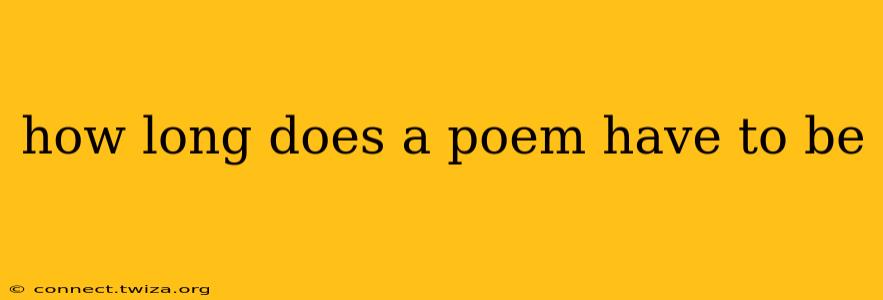How Long Does a Poem Have to Be? The Truth About Length in Poetry
There's no single answer to the question "How long does a poem have to be?" The beauty of poetry lies in its flexibility; its length is entirely dependent on the poet's vision and the poem's purpose. From breathtakingly short pieces to sprawling epics, poetry embraces a vast spectrum of lengths.
Let's explore the diverse landscape of poetic forms and lengths, addressing some common questions along the way.
What is the shortest poem possible?
The shortest poem could arguably be a single word, evoking a powerful image or emotion. Think of a haiku's concise power, often consisting of just three lines and a limited syllable count. While a single word might be considered minimalistic, it still possesses the essence of poetic expression.
What are some examples of short poems?
Many famous poems are incredibly brief. Think of Emily Dickinson's concise and impactful style, often employing short lines and a direct, impactful delivery. Her poems frequently pack a powerful emotional punch despite their brevity. Similarly, some modern poets experiment with minimalist forms, achieving profound impact within a handful of words.
Can a poem be just one sentence?
Absolutely! A single, carefully crafted sentence can capture a complete thought, emotion, or image, fulfilling all the requirements of a poem. The focus shifts from sheer length to precision and impactful word choice. This single sentence could stand alone as a powerful piece of poetry, relying on rhythm, imagery, and sound to create its effect.
How long are longer poems?
On the other end of the spectrum, epic poems like Homer's Iliad and Odyssey stretch across thousands of lines, recounting extensive narratives and exploring complex themes. These demonstrate poetry's capacity to encompass grand narratives and detailed explorations. Other long-form poetry might explore a single theme or idea in depth, extending over many stanzas and verses.
What determines the ideal length of a poem?
The ideal length is entirely subjective and depends on the poet's creative vision and the chosen form. Consider these factors:
- The theme or subject matter: A complex narrative might demand a longer format, while a fleeting emotion might be perfectly captured in a few lines.
- The chosen form: Sonnets have a prescribed length, while free verse allows for greater flexibility. Haikus adhere to a strict syllable count.
- The intended effect: A short, punchy poem might create a sharp impact, whereas a longer piece might allow for a more gradual unfolding of ideas and emotions.
Ultimately, there's no right or wrong answer. The length of a poem is determined by the poet's artistic choices and the poem's overall effect. The key is to find the form and length that best serve the poem's message and intention. Experimentation is encouraged! Don't be afraid to try different lengths and forms to discover what works best for you.
